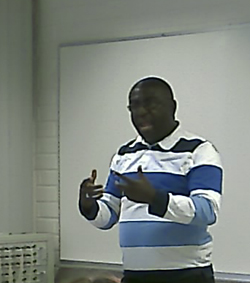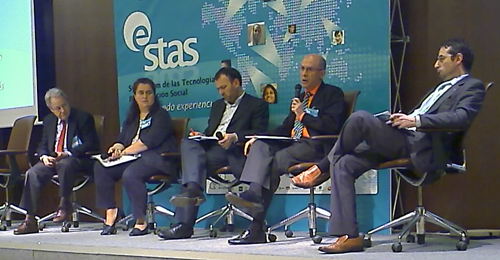By Ismael Peña-López (@ictlogist), 08 September 2008
Main categories: Education & e-Learning, ICT4D, Knowledge Management
Other tags: Carolina Islas, Haider Abbas, ict4d_symposium_2008, Joseph M Longino, Nelson Godfried Agyemang, Tersia Gowases
No Comments »
Notes from the IPID ICT4D PG symposium 2008, Mekrijärvi Research Station, Joensuu University, Finland. 8 and 9 September, 2008.
 Nelson Godfried Agyemang
Nelson Godfried Agyemang
How to make sustainable Postgraduate in ICT education programmes in developing countries.
Action research methodology.
Kurt Lewin’s iterative process: diagnose, action planning, action taking, evaluating, specifying learning.
Important point: not to take research for consultancy.
Different sustainability stages: outcomes, processes, context, etc.
In the digitizing sustainability, not everything can be digitized.
Background: Edulink fosters ICT development in Africa. Its objective is to foster capacity building and regional integration in higher education in ACP States and Regions, and to promote higher education as a means of reducing poverty
.
In this framework, see what’s the role of the combination of Higher Education and Computer Science (e.g. degrees in computer science).
Perspectives: technological, economical, occupational, spatial, cultural.
The “C” in ICTs, as a difference with IT.
Background of ICT in Tanzania: post independence situation, development of ICT in Higher Education Institutions, public sector and SMEs reforms to include ICTs. ICTs have been really useful for SMEs to access remote information.
International standard curricula bodies for Computer Science: IFIP, UNESCO.
Curricula models and development: IEEE & ACM (1991 & 2001), UNESCO (1999).
Create a curriculum for a Bsc IT, following the six principles as input: contextualization, international recognition, project based, practical orientation, research based, interdisciplinary orientation.
Challenges: to move ICTs from entertainment to promoting change, by meeting social expectations in an efficient use.
How to do security evaluation using Architecture Tradeoff Analysis Method (ATAM)? How to promote time/cost-effective security evaluation of Software Architectures in developing countries?
Security is considered a cost overhead in developing countries and so is often left unattended.
A new framework based on ESAM Software to make it easier.
How is gaming and sharing knowledge relevant for ICT4D? Knowledge sharing for development.
Development according to Van Wagner: the growth of humans throughout the lifespan.
SECI model: socialization, externalization, combination, internalization. This is what happens in the sequence of gaming from a scenario towards a goal.
If we can shift content and education to the mobile zone arena — being mobile phones the most evenly distributed ICTs — then we can make some broad impact in knowledge shared based development. Mobile pervasive gaming is a vehicle to support learning.
Third Annual ICT4D Postgraduate Symposium (2008)
By Ismael Peña-López (@ictlogist), 04 June 2008
Main categories: e-Government, e-Administration, Politics, Knowledge Management, Meetings
Other tags: cendoj, documentación judicial, network society, sociedad red
No Comments »
I have been invited by the Spanish Center of Judicial Documentation (Centro de Documentacion Judicial, CENDOJ) to impart a conference at the III Encuentro de Información y Documentación Judicial de la Red IberIUS [III Meeting about Judicial Information and Documentation of the IberIUS Network].
The idea was to give an overview of what the Network Society is and what are the concepts besides collective creation. Here come my slides (in Spanish):
Full reference and PDF downloadable here.
By Ismael Peña-López (@ictlogist), 24 April 2008
Main categories: Cyberlaw, governance, rights, Digital Literacy, Education & e-Learning, ICT4D, Knowledge Management, Meetings, Open Access, Participation, Engagement, Use, Activism
Other tags: e-stas, e-stas2008
No Comments »
e-STAS is a Symposium about the Technologies for the Social Action, with an international and multi-stakeholder nature, where all the agents implicated in the development and implementation of the ICT (NGO’s, Local authorities, Universities, Companies and Media) are appointed in an aim to promote, foster and adapt the use of the ICT for the social action.
Here come my notes for session IV. (notes at random, grouped by speaker, but not necessarily in chronological order)
 Left to right: Francisco Ortiz Chaparro, Belén Perales, Javier Estévez (moderator), Javier de la Nava Trinidad, José Manuel García Prieto
Left to right: Francisco Ortiz Chaparro, Belén Perales, Javier Estévez (moderator), Javier de la Nava Trinidad, José Manuel García Prieto
Belén Perales, IBM
Why corporate volunteering? Employees demand it and their satisfaction, engagement, etc. does increase with nonprofit or development projects engagement. And this does benefit the firms beyond profit.
Francisco Ortiz Chaparro, AHCIET
Public-private partnerships are an important key for the development of the Information Society.
Big firms are kidnapped by their highest directors, that apply for themselves retribution policies that generate huge inequalities within the firm. This is a barrier for both the credibility of the firm as socially committed and the engagement of the rest (the basis) of the employees. Shareholders should enforce their rights to achieve more transparency and accountability of the behavior of such boards of directors, for both economic management and social responsibility reasons.
There is a good amount of nonprofits and projects that are created ad hoc as (public) grant raisers. Nonprofits should change their minds and think on project designs that could include firms and even benefit them, so through a mutual benefit, partnerships between the civil society and enterprises could arise. And, at the same time, the project will gain sustainability.
Javier de la Nava Trinidad, BBVA
The five groups of stakeholders: shareholders, providers, customers, employees, the society at large. And it is not only the customers that a firm has to keep content, but the whole panoply of stakeholders.
There is an increasing need for employers to have their employees engaged and identified with the firm, to be satisfied in their workplaces.
It’s true that telecoms benefit from more ICT use, hence why fostering its use in their corporate strategy.
There is not a single model of cooperation between nonprofits and firms, but normally the model is that firms give away the know how, their knowledge, their human capital, etc.
e-Stas 2008, Symposium on Technologies for Social Action (2008)
By Ismael Peña-López (@ictlogist), 03 April 2008
Main categories: Knowledge Management, Open Access, Participation, Engagement, Use, Activism
No Comments »
I have been invited to create some materials and impart a workshop on content assessment systems. The idea is comparing the traditional academic system of double blind peer review with other systems emerging on the Information Society to assess content in online communities, like the ones used in Wikipedia, Slashdot or Digg. But without using computers: everything off-line, analogue.
A project within the framework of the Bank of Common Knowledge, the idea is to help communities — online or offline, whatever — to evaluate their incoming content in order to assess its suitability for their purposes. To do so, we created a workshop were the rudiments of several systems (three, so far) were explained, compared and practiced in simulations of situations where such content had to be evaluated — in no more than an hour.
Adapting online systems for offline use — no computers used — has been quite a challenge and, of course, not all features of online systems could be included, for both reasons of time or feasibility. One of this (sadly) missing features is all the karma system which, in some way, is the core reputation system — explicit or implicit — of many online communities, the problem being that karma is cumulative along time and requires lots of interaction, direct or indirect voting on the user and his contributions, etc., something the workshop just cannot aim at achieving. In other words: content and reputation of the user creating or promoting this content are becoming, as time passes, two sides of the same coin, something that not necessarily has been this was in analogue systems like the scientific peer review, where double blindness is usually a must.
After a beta testing that took place in February, the last version of the workshop will be officially presented today at 20:00 at the Centre de Cultura Contemporània de Barcelona [Center for Contemporary Culture], as an scheduled activity at the NOW – Meetings in the Present Continuous biennial platform.
I’m in terrible debt with the Platoniq collective (especially Olivier Schulbaum and Susana Noguero) for inviting me (and putting up together such a terrific project like the Bank of Common Knowledge), the beta testers that provided much valuable feedback unselfishly, and Pau Alsina for his networking aptitudes.
More info
By Ismael Peña-López (@ictlogist), 22 February 2008
Main categories: Digital Literacy, Knowledge Management, Writings
No Comments »
February 2008 issue of the Open Source Business Resource has published a “for the practitioner” version of my work “The personal research portal: web 2.0 driven individual commitment with open access for development”.
I slightly adapted the contents to make them more appealing to a non-scholarly audience, but the core idea remains the same.
BTW, I added a cite by the Beautiful South. It’s cryptic, but it is fully relevant — at least to me — when you think of knowledge, knowledge sharing, knowledge binding … and knowledge pimping these days.
I want to sincerely thank Dru Lavigne for betting on it.
More info:
Abstract:
Digital technologies have forever changed the way that knowledge is disseminated and accessed. Yet, the main problem knowledge workers face is invisibility: if people don’t know that you know, and people are not aware of what you know, you do not exist.
Governments and institutions are being pushed to foster Open Access (OA) literature as a way to achieve universal reach of research diffusion at inexpensive and immediate levels. Most efforts have been made at the institutional level, dedicating little energy to what the individual can do to contribute. The philosophy and tools around web 2.0 bring clear opportunities for individuals to contribute and to build a broader personal presence on the Internet and a better diffusion for their work, interests or publications.
We propose the concept of the personal research portal (PRP) as a means to create a digital identity for knowledge workers–tied to one’s digital public notebook and personal repository–and a virtual network of colleagues working in the same field. Complementary to formal publishing or taking part in offline meetings, the PRP would be a knowledge management system that would enhance reading, storing, and creation at both the private and public levels, and contribute to create an online identity that, in turn, will help to create a network whose currency is knowledge.
By Ismael Peña-López (@ictlogist), 05 December 2007
Main categories: Digital Divide, Digital Literacy, ICT4D, Knowledge Management, Meetings, Open Access
No Comments »
Third of my three seminars imparted at the he Rich-Media Webcasting Technologies for Science Dissemination Workshop, organized by the Abdus Salam International Centre for Theoretical Physics Science Dissemination Unit.
Main aspects
Seminar fundamentally based on my article The personal research portal: web 2.0 driven individual commitment with open access for development
, also presented at the Web2forDev Conference, and split in two parts:
- Part I: conceptual presentation of the Personal Research Portal
- Part II: practical workshop based on the building and managing of my own research portal, ICTlogy.net
Live recording of the session
Slides
Click here to download, or watch them on Slideshare:



 , 482.59 Kb), materials for the workshop (Spanish)
, 482.59 Kb), materials for the workshop (Spanish) , 535.35 Kb)
, 535.35 Kb) 127.01 Mb)
127.01 Mb)